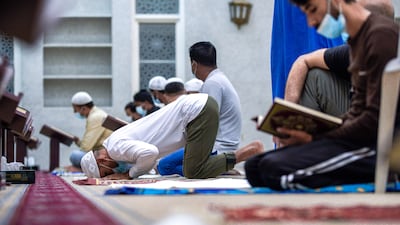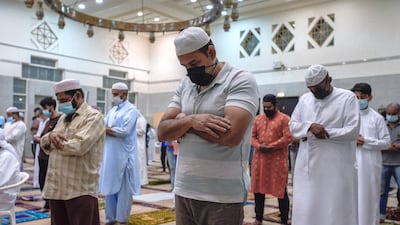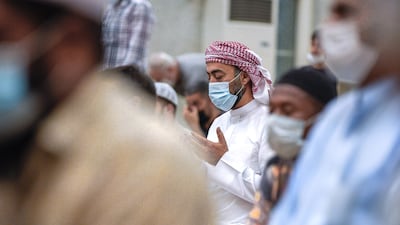Worshippers are enjoying the most normal Ramadan since 2019 after two years of Covid-19 restrictions.
Mosques have reopened to almost pre-pandemic levels, iftar tents have resumed while the taraweeh night prayers and tahajjud prayers – performed during the last 10 nights of Ramadan – will again be held from midnight onwards.
Another important feature of the holy month are lectures held in mosques. This year is the first time since 2019 that many Islamic centres in the UAE have been able to hold in-person lectures and fly in experts from around the world.
Al Salam Islamic Centre, a private, non-profit Islamic Centre for women in Dubai, has reinstated its face-to-face Ramadan classes for the first time since 2019.
"The feeling is one of gratitude and appreciation for everything that we are witnessing now after not seeing each other, not being together in person," said a spokesperson for the centre.
“For the past two years ... we didn't see each other and we had online classes. But the whole thing of having study circles again in-person is just really exciting. We can see a lot of gratitude and appreciation and more love and connection," the spokesperson said.

The centre in Umm Suqeim is running a Ramadan programme in English and Arabic every day except Friday. Between 50 and 75 women gather in study circles for sessions in English between 10am and noon and for classes in Arabic between noon and 1pm with a theme of love and affinity.
The centre has packed free Ramadan book bags for distribution for adults and children and the centre also holds iftar and taraweeh gatherings.
“After being away for so long this is a time to connect and bond through the gatherings. We really feel the value and blessing of attending study circles. After coming back this is the feeling,” she said.
"It's more of a renewal and real deep gratitude to Allah, how he made it possible."
It is a similar story at the Al Manar Islamic Centre in Dubai, which is under the patronage of Sheikha Hind bint Maktoum Al Maktoum, wife of Sheikh Mohammed bin Rashid, Vice President and Ruler of Dubai.
The centre on April 9 hosted Ismail ibn Musa Menk – also known as Mufti Menk – the Grand Mufti of Zimbabwe and a global Islamic motivational speaker, for its annual iftar.
The event was opened by Ahmed Al Haddad, Grand Mufti at the Islamic Affairs and Charitable Activities Department in Dubai, followed by a lecture by Mufti Menk who shared a message of humanity. He spoke of how Islam guarantees respect for all human beings regardless of faith, colour, nationality or background.
"[We should] help one another as humans [and] to bear in mind that we are sharing the same planet," he told those present.
"Whatever this planet goes through we will all go through. If there is global warming we are all affected. We have to be very responsible in the way we manage the environment and all other factors," he said.
Mohsin bin Ahmed, a member of the organising committee at the Al Manar centre, said its Ramadan programme was a chance to increase understanding of Islam and hear from the right sources.
“The event was aimed at people from different faiths," Mr Ahmed said. "We were very happy to host the event because we got the opportunity to sit together at one table for the first time in three years," he said.
“Meeting in person is very different. We were able to give each other time unlike in online meetings where at the click the call ends and everyone leaves," Mr Ahmed said.
In 2020, the centre organised a virtual session to answer questions from new Muslims celebrating their first Ramadan alone away from their families, and of non-Muslims who wished to know more about Ramadan.
“This was a wonderful experience because we were able to see each other. It was a great feeling. There were people from 25 countries attending the iftar together."
























